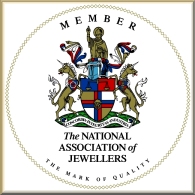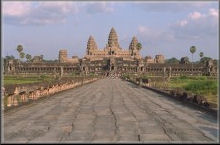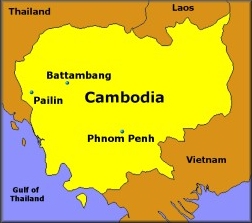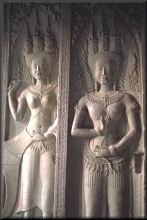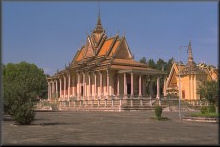Pailin Rubies & Sapphires - ក្រុងប៉ៃលិន
The Ruby & Sapphire Mines at Pailin, Cambodia.
|
Angkor Wat, Siem Reap. |
My first visit to Cambodia was in early 1992 when the UN (UNTAC) took over administration of the country. The UN were there to end the years of civil war which had ravaged Cambodia. There were many parts of the country which opened to the outside world for the first time in decades. There were also parts of the country which remained outside the control of the UN or government forces. These were mostly the regions close to the Thai border, which were under the control of the Khmer Rouge or 'Democratic Kampuchea' as they are known in Cambodia. |
|
|
Pailin, with it's remote location and rich natural resources, was an ideal base for the Khmer Rouge. The close proximity to the Thai border meant the Khmer Rouge were able to trade and receive supplies, which enabled them to continue their insurgency. |
Apsaras |
|
The Silver Pagoda, Phnom Penh |
In 1994 the government launched an attack to crush the remaining pockets of Khmer Rouge. The government forces eventually over-ran Pailin where they proceeded to loot and pillage. The Khmer Rouge re-grouped in the surrounding hills and in the counter attack, forced the government troops eastwards almost to the outskirts of Battambang. In late 1996 the Khmer Rouge in Pailin, decided to lay down their weapons and in return they would be allowed to run Pailin as an autonomous province. The surrender at Pailin was a catalyst which eventually led to the end of the Khmer Rouge insurgency. |

One rather shocking sight in Pailin is the number of mountains & hills which
have been left totally bare through the logging carried out by the Khmer
Rouge. I also noticed a few furniture factories in Pailin making wooden
furniture so the logging continues.

The Samaki Market is the central point of Pailin. Most of the goods available
in the market are imported from neighbouring Thailand.

A market trader with her daughter sit outside their stall of imported Thai music
Quite a few people I met could speak Thai as well as their native Khmer.

A row of gem cutters in the Samaki Market. These guys were cutting zircons &
garnets. There are also a number of stone dealers in the market with a real
mixture of gems, mostly low grade. Some of the stones were obviously
imported from Thailand, all being offered as local material. There was also a fair
amount of synthetics mixed in some of the parcels.

A gem cutter polishing sapphires. Like most things in Pailin, the machinery used for
faceting is imported form neighboring Thailand. The quality of the cutting varied
from not bad to others that looked as though they had been cut with an axe!

Outside the Samaki Market where most of the activity seems to take place. About
half the roads in the city centre are surfaced, the rest is dusty dirt road.

The Pailin Good Samaritan's Gem Cutting Training School. I had to take this
picture just for the name!

The sign outside the Pailin Police Station asking people to hand in their weapons.
Cambodia is saturated with weapons of all kinds including land mines which still
and maim and kill today. It is sad but not unusual to see people with legs missing
hobbling around on crutches.

The road up to Wat Phnom Yat & the entrance to Wat Kong Kang on the right. On
the outer walls of Wat Kong Kang are decorated with carvings copied from Angkor
Wat, which includes 'Apsaras' and 'The Churning of The Sea of Milk'.

On the climb up to Wat Phnom Yat I cam across these two guys who were
scouring the ground looking for sapphires. They told me they have found
stones there in the past especially after heavy rainfall, when they are
joined by sometimes hundreds of other people.

This man was chopping up wood to make a fence.

A family living on Phnom Yat next to the temple.

The newly renovated Wat Phnom Yat, which overlooks Pailin city & valley.
The location on the top of Phnom Yat (Phnom = mountain) meant the
temple took a real bashing during the war years. The bullet holes have
now been filled and painted over in bright colours & shell casings are
used as incense holders.

This somewhat bizarre scene at Wat Phnom Yat is supposed to represent Hell.
There are images of people being tortured in very barbaric ways. You can find
similar scenes of torture painted at Tuol Sleng in Phnom Penh, the notorious
interrogation centre used by the Khmer Rouge in the 70's.

These statues represent the Buddhist legend of Chu Chok Gun Ha Chali.

When the women of Cambodia are widowed, they traditionally become nuns
and take care of the temples.

The Chedi at Wat Phnom Yat, which overlooks Pailin in a westerly direction.

The view south west over the Pailin valley. The alluvial sapphire deposits are
spread out across the valley floor.

The view north over the Pailin valley.

The view west looking over Pailin city.

As in all parts of Cambodia there is extreme poverty. Pailin has one of the
lowest crime rates in the country, which is attributed to the harsh swift
'justice' system of the Khmer Rouge, who would often execute criminals
on the spot without trial.

Open cast mining. The truck loads of gem bearing soil are taken away to
jigs to be washed and the sapphires extracted.

A jig used to wash the gem bearing soil. Note the flags and spirit table all
there to bring good fortune to the miners.

Miners showing me their parcels of rough sapphires. These particular people
were showing me smaller sizes but the stones had excellent blue colour.

Inspecting rough sapphires with my colleague, Ted Themelis.

Local children.

This mining operation is to the west of Pailin. There were quite a few people
working on this mine. The miners here showed me small parcels of rubies.

A jig used to sieve the gem gravel.

The gems are picked out from the washed gravel by hand.

Gem miners taking a break for lunch.

